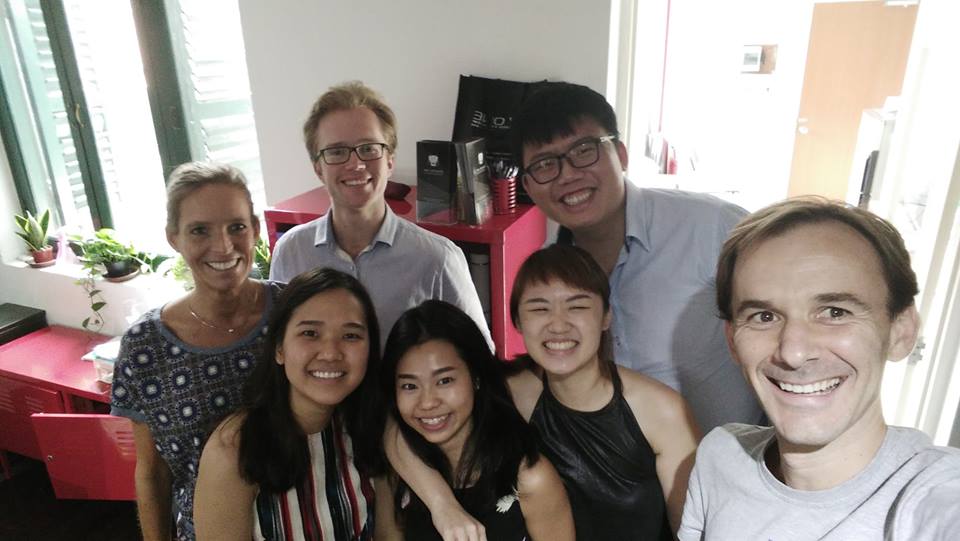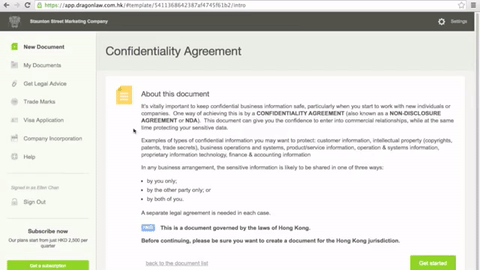Interview by Amelia Chew & Lee Ji En | Edited by Stella Chen
Andrea Loh is a Sales Manager at legal tech start-up Dragon Law. After graduating from the National University of Singapore (NUS) Faculty of Law in 2011, Andrea was a commercial litigator at Harry Elias Partnership, emerged as the runner-up under AirAsia CEO Tony Fernandes in The Apprentice Asia and joined a start-up in India for 2 years before returning to Singapore early this year. In this interview, Andrea shares about her experience progressing through an incredibly non-linear career (at least to the outsider’s eye), the challenges that she’s faced along the way, and how she makes sense of all of it.
Background
from a law firm, to The Apprentice Asia, then India…
Tell us a bit about your background. Where did you study law, what did you do after graduation, and where have you gone since then?
I’ve always wanted to be a lawyer. I did mooting at NUS, and then commercial litigation at Harry Elias Partnership for two years during which I also went on The Apprentice Asia. That’s when I realised that while legal is a wonderful industry, in the world of business it is just one part of a much bigger ecosystem. And that’s when I realised that I needed to acquire more skills and the quickest trajectory to do that would be to join a start-up.
I then joined a mobile technology start-up in India. There, I did a lot of client-facing work. I talked to clients, helped to build partnerships, did some marketing as well, both social media and product demo videos. But my biggest reinvention was to become a business analyst. That is the person that interfaces with clients, finds out their business requirements and translates those requirements into technical documentation that the software developers use to code the final product.
I eventually came back to Singapore and looked at the local start-up scene. Again, the same question of ‘MNC vs start-up’ came up. Start-ups won again, for the second time. Dragon Law was obviously doing something that I personally believe in. I like their product. I like what they do. It’s a very strong team. And so I chose to join them. I now do sales, which is again something I’ve never done before.
They know business, and I just knew the Rules of Court.
You mentioned that The Apprentice Asia was a turning point. But what made you join The Apprentice Asia?
I freaking love the show. I’ve been watching it since I was twelve and Donald Trump led season 1. It wasn’t a matter of ‘oh I hope to learn more skills’, because you go in there to compete and they expect you to have the skills. I was up against skilled entrepreneurs and MNC folks. They know business, and I just knew the Rules of Court. That’s when I realised that I was missing quite a lot of stuff.
So after The Apprentice Asia you realised that there were many skills you didn’t have, and that’s why you went to India. Why India?
I chose India because India is the kind of economy that is growing so quickly that the only way to understand it is to be on the ground. I saw it as a benefit to be in a developing economy rather than a mature one. I mean, if I go to a mature economy, it will always be there. Hong Kong is not going to be too different five years down the road. India is going to be very different five years down the road, so I wanted to be ahead of that curve.

Andrea (back row, sixth from left) with her colleagues in a mobile tech start-up in India
Could you share some of the challenges you faced in India? What were your takeaways from your time there?
The biggest challenge was probably understanding corporate culture and cultural sensitivities there. I’m quite direct, but in India there’s a lot of respect for hierarchy. Initially, this caused me to step on more toes than I should have. But I learnt, and that overall has made me more sensitive as a person and that is always a good thing.
India is a ‘try anything, be anything, do anything’ kind of society. People talk about the bureaucracy, but I can tell you from being on the ground there that people succeed by finding creative ways around those very rules. That makes them a very innovative society actually. They are not afraid to give something a go, and by extension not afraid to fail. For us in Singapore, the fear of failure sometimes prevents us from even trying.
I remember I was helping one of my colleagues who had built a website. It was targeted at non-profits and he was getting advertising revenue because it had a lot of traffic. After a few months, he came to me and said that he had to shut down his website because he was not allowed to profiteer from his website in the non-profit space. I said, “Oh my, I’m so sorry you had to shut down your website.” But he just said, “I’m going to build something new tonight”. It was the most throwaway conversation for him I’m sure, but for me it’s the one encounter that encapsulates everything. “I’ll just build something new tonight.”
You said you considered between MNCs and start-ups, and start-ups won again…
It was just more appealing to be one of fifty than one of a few thousand. That’s just it to me. Dragon Law is an ambitious, fast-growing company. I’m an ambitious, fast-growing individual. So it’s a fit.
…and now Dragon Law

Andrea (front row, first from left) with the Dragon Law team
Just for the uninitiated, could you explain what Dragon Law does?
We are a legal technology platform that allows our users to quickly and efficiently generate custom legal contracts using our question-and-answer interface. We’ve reversed engineered tons of legal contracts and we build from clause up rather than template down, and so it’s custom every single time. We’re not a template business and we will never give you blanks that you fill in nor are we an online text editor. Our technology comprises wizards that associate questions with a bunch of clauses and literally generate the contract on the spot.

Dragon Law‘s interface
How do Dragon Law’s services differ from those offered by law firms?
Ultimately our philosophy as a company is to move away from the existing model where legal is an outsourced black box. Currently, something goes to legal because people don’t know how to solve it. Dragon Law aims to turn that model on its head and to put information and tools that were once the mainstay of a very small group into the hands of businesses themselves. We want to provide them with reliable information. For our product, there are explanatory notes for every contract and various modules within each contract. We also run free legal academies because we’re about education and the business and entrepreneurial community as a whole.
Business contracts are more than just legal documents. It’s a commercial decision at the end of the day. Legal will just tell you about the risks, but a good contract will allow you to do what you want while protecting you. I think that’s a huge paradigm shift that needs to happen in the industry and it certainly underlies what we do at Dragon Law.
We’re not here to Uber the industry. We don’t see ourselves as a threat to law firms. In fact, we are complementary.
How do you think Dragon Law is influencing the transformation of the legal industry in Singapore?
We’re not here to Uber the industry. We don’t see ourselves as a threat to law firms. In fact, we are complementary. That’s why we are in open partnerships with DLA Piper and Stephenson Harwood, among many others. Law firms realise that the efficiencies that come from technology allow them to focus on high-value work. Frankly, that’s how they make their money, not from routine work.
Taking a step back…
What do you think young lawyers and law students should be aware of, given the changes in the legal industry?
Disruption has happened in many other areas of professional services. It has happened in accounting and bookkeeping. It’s coming for our industry as well. Businesses are getting smarter and leaner and they are looking actively for solutions that work for them. Change is coming. It seems like a simple thing, but I think the awareness of that change means everything.
We are trained with a professional degree but ultimately with a mind that hopefully is much more agile.
How should we respond to the oncoming change?
Lawyers should be alive to the fact that they can apply their skills to more than just the law. Understanding that would give everyone a sense of mobility, which I feel is lacking right now. Having spoken to so many people on the ground, the overarching sense is that they don’t know what else to do, that their skills are not transferable, and that they’re stuck. We are trained with a professional degree but ultimately with a mind that hopefully is much more agile. That should be an encouragement to all young lawyers.
For friends who have come to you and said that they’re stuck, what do you advise them to do?
I encourage many of them to look at tech. In tech, money is flowing in. Growth is happening. People are looking for good talent. Tech rewards intelligent and hardworking people. It can be a very rewarding area to be in because you are in a high growth phase, you learn many parts of the business, and the pace of it is fast. That would probably appeal to a lot of lawyers who are used to pace as well. If you want a higher chance of finding a job, that’s probably where you want to start looking.
…and piecing it all together
Your path appears very much non-linear to an outsider and you seem to be someone who sees an opportunity and goes for it. Have you ever doubted any of your choices?
I think India probably. There were points where I did question if I should have joined a more established and stable enterprise. You have to be prepared for these questions to come, and you just have to come back to the conviction that brought you there in the first place. Frankly, it is only human to doubt. But I have to get out of my doubt to say that it will all make sense in the grand scheme of things. Maybe not right now, but it definitely will eventually.
What did you do when you had doubts?
I come back to why I did it in the first place, because I only act upon a strong conviction. That’s why that must guide everything that you do. If it doesn’t, then you will never have that conviction to come back to and the doubt will continue to plague you.
If you are planning to switch, don’t switch just for a push factor. There needs to be a pull. You got to understand why you have to do what you have to do. I have seen it in friends who have left the law out of protest, thinking they cannot handle it anymore. Then they have wandered in the wilderness for a little bit, and that can be very emotionally challenging for people. Whereas for someone who knows why they are doing things, that helps them keep the eye on the prize.
As long as you are always in the front line, whatever that front line is, then you are going to position yourself very well within the organisation. You are a fee-earner; you are a revenue generator; you are not a cost centre.
What’s the philosophy that guides your decisions?
The philosophy is to be in the front line of any business endeavour. In a SaaS (software-as-a-service) company, I would want to be in sales. In a law firm, I would want to be a lawyer. But I would never want to do legal in a SaaS company. As long as you are always in the front line, whatever that front line is, then you are going to position yourself very well within the organisation. You are a fee-earner; you are a revenue generator; you are not a cost centre.
A lot of the time when people want to transition, it’s always thought of in terms of function, which is why lawyers find it hard to shift. They always want to be in legal, but that never allows you to reinvent yourself. So as far as I’m concerned, the thinking needs to change.
We’ve heard that you’re one of those people who always had too much energy for law, even when you were in law school. How did you come about developing your philosophy? Were you already thinking about these things when you were in law school?
I would say that law school was quite directionless for me. Most conversations were around politics, law, tutorials or training contract applications. This isn’t the fault of law school, but my hunch is it would be quite different if you were a business student. As part of your role, your thinking would be very much around enterprises and commercial issues.
That’s why I credit the whole The Apprentice Asia experience. I was meeting CEOs all the time, and CEOs of MNCs, I’m talking to them and we’re being treated as equals. So from that perspective it helped me to direct a lot of my energy in a way that made more sense.

Andrea (first from left) during her two-year stint in India
What is your long-term goal?
It depends on whether you want to stay in a vertical or not. If you want to stay in a vertical, then it’s just a matter of ascension. If you’re looking for lateral movement, that tech is a great place for that.
For me, lateral mobility is very important. There are a lot of domain experts out there, but very few people with broad skillsets. While the prevailing view for decades has been specialisation, it’s not going to work anymore. Based on what I know from speaking to CEOs and MDs, we need breadth.
Your personal vision in the next ten years?
This one I really don’t know. I just know that I need to be so much better. I need to learn so much more. That’s what drives me every single day. I think that sense of inadequacy. That’s the great part of being an insecure overachiever. You will always push yourself harder to learn, which is good.
People is a series that aims to feature individuals who have taken the route less travelled. We sit down for a chat with people who have interesting careers and perspectives to share. There are only two criteria to qualify for a feature in this series: (i) a background in the law (whether this is a law degree or a job related to the law); and (ii) a job that is not in a law firm. If you know of anyone with a perspective to share or if there is someone you would like to hear from, drop us a note at media@lawtech.asia!
